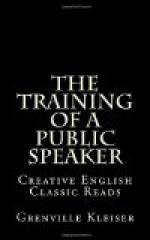THE ADVANTAGES OF READING
In reading, our judgment goes upon surer ground, because often our good wishes for the speaker, or the applause bestowed on him, surprizes us into approbation. We are ashamed to differ in opinion from others, and by a sort of secret bashfulness are kept from believing ourselves more intelligent than they are; tho indeed we are aware, at the same time, that the taste of the greater number is vicious, and that sycophants, even persons hired to applaud, praise things which can not please us; as, on the other hand, it also happens that a bad taste can have no relish for the best things. Reading is attended, besides, with the advantage of being free, and not escaping us by the rapidity which accompanies action; and we may go over the same things often, should we doubt their accuracy, or wish to fix them in our memories. Repeating and reviewing will, therefore, be highly necessary; for as meats are chewed before they descend into the stomach, in order to facilitate their digestion, so reading is fittest for being laid up in the memory, that it may be an object of imitation when it is no longer in a crude state but has been softened and elaborated by long meditation.
HOW TO READ MOST PROFITABLY
None, however, but the best authors, and such as we are least liable to be deceived in, demand this care, which should be diligent and extended even almost to the point of taking the pains to transcribe them. Nor ought judgment to be passed on the whole from examining a part, but after the book has been fully perused, it should have a second reading; especially should this be done with an oration, the perfections of which are often designedly kept concealed. The orator, indeed, often prepares, dissembles, lies in wait, and says things in the first part of the pleading which he avails himself of in the last part. They may, therefore, be less pleasing in their place, while we still remain ignorant of the purpose for their being said. For this reason, after a due consideration of particulars, it would not be amiss to re-read the whole.
WHAT TO READ
Theophrastus says that the reading of poetry is of vast service to the orator. Many, and with good reason, are of the same opinion, as from the poets may be derived sprightliness in thought, sublimity in expression, force and variety in sentiment, propriety and decorum in character, together with that diversion for cheering and freshening minds which have been for any time harassed by the drudgery of the bar.




